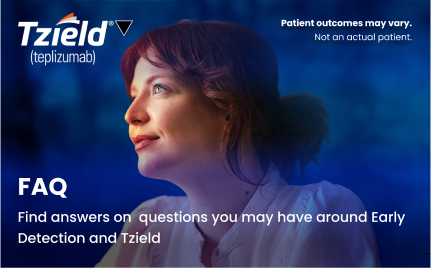Autoimmune T1D is no longer considered a solely juvenile disease,1 and screening procedures should reflect this. More than half of new patients are adults,2 and the benefits of screening in the adult population are multifaceted, including the potential to avoid DKA and prevent misdiagnosis of T2D.2,3,6
The combination of patient education and CGM technology can empower patients and families to understand how to respond to glucose fluctuations effectively,1–4,12 before blood glucose needs more tight control at symptom onset (Stage 3).6,8 This can thereby optimise blood glucose levels from the outset and avoid complications.7–11
Even without symptoms, the autoimmune attack and destruction on beta cells is actively
and progressively occurring.1–3 Screening allows HCPs to diagnose early-stage autoimmune
T1D and monitor and educate affected individuals, potentially improving long-term outcomes.4–6 Early identification and monitoring of autoimmune T1D reduces the likelihood of severe emergencies like DKA at diagnosis, which often requires urgent, high-resource intervention.4,5 By reducing the risk of DKA and other complications, screening and monitoring can reduce hospitalisations and lessen the overall demand on emergency and acute care resources4,6
As healthcare moves toward a more preventative model, proactive screening aligns with broader healthcare goals of reducing disease burden and improving patient outcomes.14,15
Although detection of autoantibodies through screening may initially cause stress and anxiety,
this typically reduces over time. Screening allows time for families to adjust, engage with educational and emotional support and build a support network to allow a smoother transition to Stage 3 autoimmune T1D.1,2 In the TEDDY study, children diagnosed through screening and enrolled in monitoring programmes experienced improved diabetes-specific quality of life and parents reported lower parenting stress compared to community controls outside of screening programmes*3. In a UK study interviewing parents of children screened, screening benefits were reported to outweigh temporary distress, with most
feeling positive about the experience and reporting willingness to participate again and recommend to others.4
Get in Touch with Us
Questions? Leave your details and we'll reach out to you as soon as possible.
Get in touchMAT-XU-2500770 (v1.0) | October 2025
